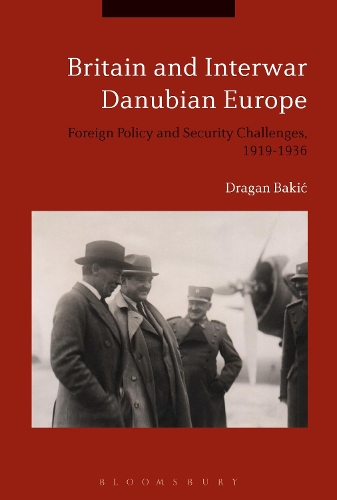
Britain and Interwar Danubian Europe: Foreign Policy and Security Challenges, 1919-1936
(Paperback)
Available Formats
Publishing Details
Britain and Interwar Danubian Europe: Foreign Policy and Security Challenges, 1919-1936
By (Author) Dr Dragan Bakic
Bloomsbury Publishing PLC
Bloomsbury Academic
29th November 2018
United Kingdom
Classifications
Tertiary Education
Non Fiction
International relations
327.410496
Physical Properties
Paperback
288
Width 156mm, Height 232mm, Spine 16mm
440g
Description
Danubian Europe presented constant and serious security risks for European peace and stability and, for that reason, contrary to conventional wisdom, it commanded the attention of British diplomacy with a view to appeasing local conflicts. Britain and Interwar Danubian Europe examines the manner in which the Foreign Office perceived and treated the antagonism between the Little Entente, comprised of Czechoslovakia, Yugoslavia and Romania, and Hungary, on the one hand, and revisionist Bulgaria and her neighbours in the Balkans, on the other, and the impact that these local conflicts had in connection with Franco-Italian rivalry in Central/South-Eastern Europe. With Hitlers accession to power, Danubian Europe was viewed in Whitehall in relation to its place in the prospective policy for preserving Austrian independence and containing German aggression. Dragan Bakic argues that the British approach to security problems in Danubian Europe had certain permanent features which stemmed from the general British outlook on the new successor states -the members of the Little Entente- founded on the ruins of the Habsburg monarchy. This book shows that it was the lack of confidence in their stability and permanence, as well as the misperceptions about the motives and intentions of the policies pursued by other Powers towards Central/South-Eastern Europe, which accounted for the apparent sluggishness and ineffectiveness of the Foreign Offices dealings with security challenges. Based on extensive, original archival research, this is a fascinating volume for any historian keen to know more about the 20th-century history of East-Central Europe or British foreign policy in the interwar years.
Reviews
In all, this is an extraordinary work that makes a welcome contribution to the growing literature on interwar Danubian Europe. It will be of considerable interest to scholars of European studies, international relations, and diplomacy. * Canadian Slavonic Papers *
This is a well-researched, insightful and challenging critique of British inter-war foreign policy as diplomats and politicians struggled to find solutions to problems posed by the post-First World War settlement in Central Europe and the Balkans. Voices insisting that European peace was indivisible and that the affairs of Central Europe could not be dismissed as faraway and insignificant were ignored with tragic consequences, offering lessons that remain relevant today. * Alan Sharp, Emeritus Professor of International History, Ulster University, UK *
The British knew little about Eastern Central Europe between the two world wars, for only in Shakespeare does Bohemia have a coastline. Yet, as Dragan Bakic shows in this lucid and timely exposition, the region occupied by the successor states of the Hapsburg Empire played an important role in British foreign policy, which intersected with Britain's relations with the Great Powers at crucial moments. * T.G. Otte, Professor of Diplomatic History, University of East Anglia, UK *
In considering the diplomacy of interwar Europe from an unexpected angle Dragan Bakic helps to illuminate its complexities. Combining thorough research in British sources with previously unavailable or unused Yugoslav archives, this work is a valuable resource for those interested in both the period and in the wider workings of British diplomacy. * Erik Goldstein, Professor of International Relations and History, Boston University, USA *
A welcome addition to an otherwise scant bibliography on British foreign policy in this part of Europe in the period before the Munich Conference ... An important book, grounded in excellent archival research, which opens many interesting questions ... As such, it should stimulate further research of the topic. * European History Quarterly *
Author Bio
Dragan Bakic is Research Fellow at the Institute for Balkan Studies, Serbia.
